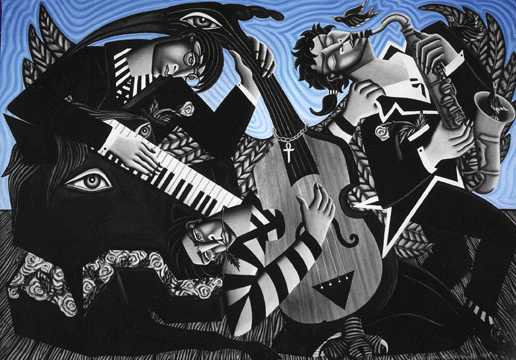Greetings and love everybody!
It's been a while since I stopped posting new stuff.A friend of the blog, Beth Kelly, managed to wake me up proposing me an interesting article of hers to share with.Beth's article is about Bob Marley's remarkable cultural influence and commercialization of his profile.
I'm still not sure if I'll post fresh goodies regularly,but I'll try to fix some requested links and we see...
The Legacy of Bob Marley
Bob Marley's legacy as a musician is unquestionable. He has become a touchstone of the musical world for performers and listeners alike, and has influenced many popular singers and musicians of today. However, there is a much more commercial side to his legacy, one that he would not have look favorably upon. In the years since his death, numerous products featuring his likeness have been released, and his heirs have traded heavily off of his fame and status as a musical icon to make a great deal of money – going against much of what Marley himself actually stood for.
Bob Marley was born and raised in Jamaica, where the island’s musical
traditions heavily influenced his unique style of reggae songwriting.
Throughout the 1960s and 70s, his fame as a musician grew, making him
by far the most popular and influential reggae artist of
any generation. During this time period, Marley also became an icon
of the counterculture movement, in part due to his famous consumption
of marijuana as a spiritual practice in line with his Rastafarian
faith. It was this faith which also led him to decide not to make a
last will and testament, out of concern for the possibility that his
estate would become too commercialized and capitalist. Marley was
diagnosed with melanoma in 1977, and died of the disease due to
widespread metastasis in 1981.
In spite of his best efforts, Marley's estate and legacy became a hugely profitable and commercial brand. While it cannot be denied that Marley made a great deal of money from his music during his own lifetime, it was always his viewpoint that he was simply doing what he loved to do, and that the money was never the point of it. In fact, today, the royalties from the hit song “No Woman No Cry” still go directly to a soup kitchen in Jamaica. He was a strong proponent of the idea that money could not buy happiness, and was known for never changing his music to make it more commercially appealing. In fact, Marley’s last words to his son, Ziggy, who recently performed his own and his father’s music on DTV’s Guitar Center Sessions (see here), were, “Money can’t buy life.” The widespread branding of everything from posters to a personalized brand of Bob Marley marijuana that can be seen in the market today is far out of line with Marley's vision and beliefs, and would never have occurred during his lifetime.
In a broader context, Marley, in this regard, is part of a larger group of 1960s counterculture icons and ideals that have been distorted for profit. Such commercialization can be seen in everything from the immense profits made off of the legacy of the Woodstock festival to the wide array of merchandise, much of which is based on the classic counterculture film Easy Rider, available today.
On a brighter note, Marley's music and ideals have, however, influenced many of the musical icons of today. Despite the fact that commercialization has become the norm in modern music, many musicians and artists themselves hold to Marley's belief in music as a creation based on love of creating. In fact, modern pop music, especially that from more independent artists and labels, commonly uses this as a lyrical theme. Marley’s influence can be found in artists as widespread as The Fugees, Rihanna, Jazmine Sullivan, Naz, and many many more.
Bob Marley is unquestionably one of the most influential artists of the 20th century. His legacy, however commercialized it may have become since his death, still stands strong. In 2015, which is both the 33rd anniversary of his tragic death and would mark his 70th birthday if he were still alive, his influence on music and culture is just as strong as ever.
For those interested of an in-depth biography can check out this nice ebook of Timothy White called "Catch a fire".

